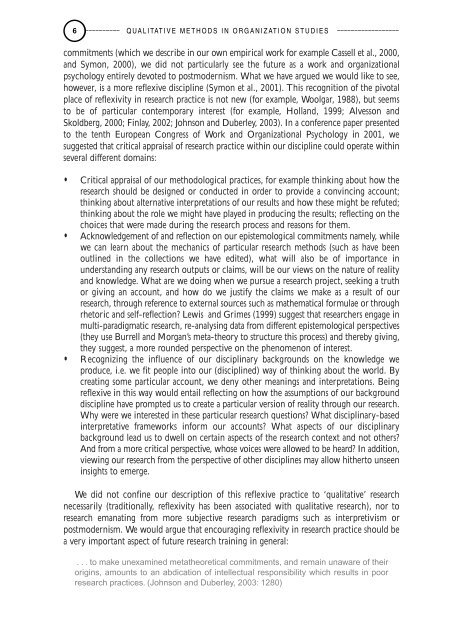essential-guide-to-qualitative-in-organizational-research
essential-guide-to-qualitative-in-organizational-research
essential-guide-to-qualitative-in-organizational-research
- No tags were found...
You also want an ePaper? Increase the reach of your titles
YUMPU automatically turns print PDFs into web optimized ePapers that Google loves.
6 –––––––––– QUALITATIVE METHODS IN ORGANIZATION STUDIES ––––––––––––––––––commitments (which we describe <strong>in</strong> our own empirical work for example Cassell et al., 2000,and Symon, 2000), we did not particularly see the future as a work and <strong>organizational</strong>psychology entirely devoted <strong>to</strong> postmodernism. What we have argued we would like <strong>to</strong> see,however, is a more reflexive discipl<strong>in</strong>e (Symon et al., 2001). This recognition of the pivotalplace of reflexivity <strong>in</strong> <strong>research</strong> practice is not new (for example, Woolgar, 1988), but seems<strong>to</strong> be of particular contemporary <strong>in</strong>terest (for example, Holland, 1999; Alvesson andSkoldberg, 2000; F<strong>in</strong>lay, 2002; Johnson and Duberley, 2003). In a conference paper presented<strong>to</strong> the tenth European Congress of Work and Organizational Psychology <strong>in</strong> 2001, wesuggested that critical appraisal of <strong>research</strong> practice with<strong>in</strong> our discipl<strong>in</strong>e could operate with<strong>in</strong>several different doma<strong>in</strong>s:• Critical appraisal of our methodological practices, for example th<strong>in</strong>k<strong>in</strong>g about how the<strong>research</strong> should be designed or conducted <strong>in</strong> order <strong>to</strong> provide a conv<strong>in</strong>c<strong>in</strong>g account;th<strong>in</strong>k<strong>in</strong>g about alternative <strong>in</strong>terpretations of our results and how these might be refuted;th<strong>in</strong>k<strong>in</strong>g about the role we might have played <strong>in</strong> produc<strong>in</strong>g the results; reflect<strong>in</strong>g on thechoices that were made dur<strong>in</strong>g the <strong>research</strong> process and reasons for them.• Acknowledgement of and reflection on our epistemological commitments namely, whilewe can learn about the mechanics of particular <strong>research</strong> methods (such as have beenoutl<strong>in</strong>ed <strong>in</strong> the collections we have edited), what will also be of importance <strong>in</strong>understand<strong>in</strong>g any <strong>research</strong> outputs or claims, will be our views on the nature of realityand knowledge. What are we do<strong>in</strong>g when we pursue a <strong>research</strong> project, seek<strong>in</strong>g a truthor giv<strong>in</strong>g an account, and how do we justify the claims we make as a result of our<strong>research</strong>, through reference <strong>to</strong> external sources such as mathematical formulae or throughrhe<strong>to</strong>ric and self-reflection? Lewis and Grimes (1999) suggest that <strong>research</strong>ers engage <strong>in</strong>multi-paradigmatic <strong>research</strong>, re-analys<strong>in</strong>g data from different epistemological perspectives(they use Burrell and Morgan’s meta-theory <strong>to</strong> structure this process) and thereby giv<strong>in</strong>g,they suggest, a more rounded perspective on the phenomenon of <strong>in</strong>terest.• Recogniz<strong>in</strong>g the <strong>in</strong>fluence of our discipl<strong>in</strong>ary backgrounds on the knowledge weproduce, i.e. we fit people <strong>in</strong><strong>to</strong> our (discipl<strong>in</strong>ed) way of th<strong>in</strong>k<strong>in</strong>g about the world. Bycreat<strong>in</strong>g some particular account, we deny other mean<strong>in</strong>gs and <strong>in</strong>terpretations. Be<strong>in</strong>greflexive <strong>in</strong> this way would entail reflect<strong>in</strong>g on how the assumptions of our backgrounddiscipl<strong>in</strong>e have prompted us <strong>to</strong> create a particular version of reality through our <strong>research</strong>.Why were we <strong>in</strong>terested <strong>in</strong> these particular <strong>research</strong> questions? What discipl<strong>in</strong>ary-based<strong>in</strong>terpretative frameworks <strong>in</strong>form our accounts? What aspects of our discipl<strong>in</strong>arybackground lead us <strong>to</strong> dwell on certa<strong>in</strong> aspects of the <strong>research</strong> context and not others?And from a more critical perspective, whose voices were allowed <strong>to</strong> be heard? In addition,view<strong>in</strong>g our <strong>research</strong> from the perspective of other discipl<strong>in</strong>es may allow hither<strong>to</strong> unseen<strong>in</strong>sights <strong>to</strong> emerge.We did not conf<strong>in</strong>e our description of this reflexive practice <strong>to</strong> ‘<strong>qualitative</strong>’ <strong>research</strong>necessarily (traditionally, reflexivity has been associated with <strong>qualitative</strong> <strong>research</strong>), nor <strong>to</strong><strong>research</strong> emanat<strong>in</strong>g from more subjective <strong>research</strong> paradigms such as <strong>in</strong>terpretivism orpostmodernism. We would argue that encourag<strong>in</strong>g reflexivity <strong>in</strong> <strong>research</strong> practice should bea very important aspect of future <strong>research</strong> tra<strong>in</strong><strong>in</strong>g <strong>in</strong> general:. . . <strong>to</strong> make unexam<strong>in</strong>ed metatheoretical commitments, and rema<strong>in</strong> unaware of theirorig<strong>in</strong>s, amounts <strong>to</strong> an abdication of <strong>in</strong>tellectual responsibility which results <strong>in</strong> poor<strong>research</strong> practices. (Johnson and Duberley, 2003: 1280)



